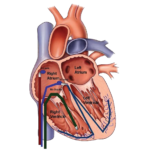Electrophysiology Study
An electrophysiology (EP) study is a test performed to assess your heart’s electrical system or activity and is used to diagnose abnormal heartbeats or arrhythmia. The test is performed by inserting catheters and then wire electrodes, which measure electrical activity, through blood vessels that enter the heart.
How is an EP study done?

During an EP study, your doctor inserts small, thin wire electrodes into a vein in the groin (or neck, in some cases). The doctor will then thread the wire electrodes through the vein and into the heart. To do this, the doctor uses a special type of X-ray “movie,” called fluoroscopy.
How long is an EP study?
An EP study is a test for abnormal heart rhythm. It usually takes about two to four hours.
Are you awake during an EP study?
You‘ll get medicine (a sedative) that will help you relax. But you‘ll be awake and able to follow instructions during the test. Your nurse will clean and shave the part of your body where the doctor will be working. This is usually in the groin but maybe the arm or neck.
During an EP study, your doctor inserts small, thin wire electrodes into a vein in the groin (or neck, in some cases). The doctor will then thread the wire electrodes through the vein and into the heart. To do this, the doctor uses a special type of X-ray “movie,” called fluoroscopy.
How long is an EP study?
An EP study is a test for abnormal heart rhythm. It usually takes about two to four hours.
Are you awake during an EP study?
You‘ll get medicine (a sedative) that will help you relax. But you‘ll be awake and able to follow instructions during the test. Your nurse will clean and shave the part of your body where the doctor will be working. This is usually in the groin but maybe the arm or neck.
